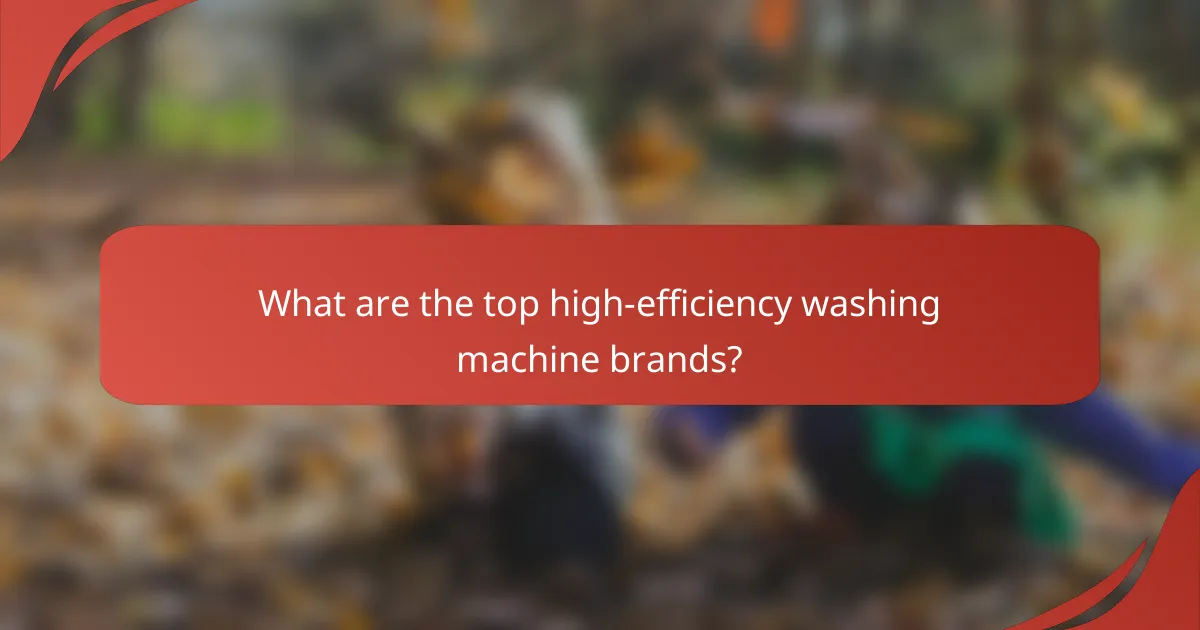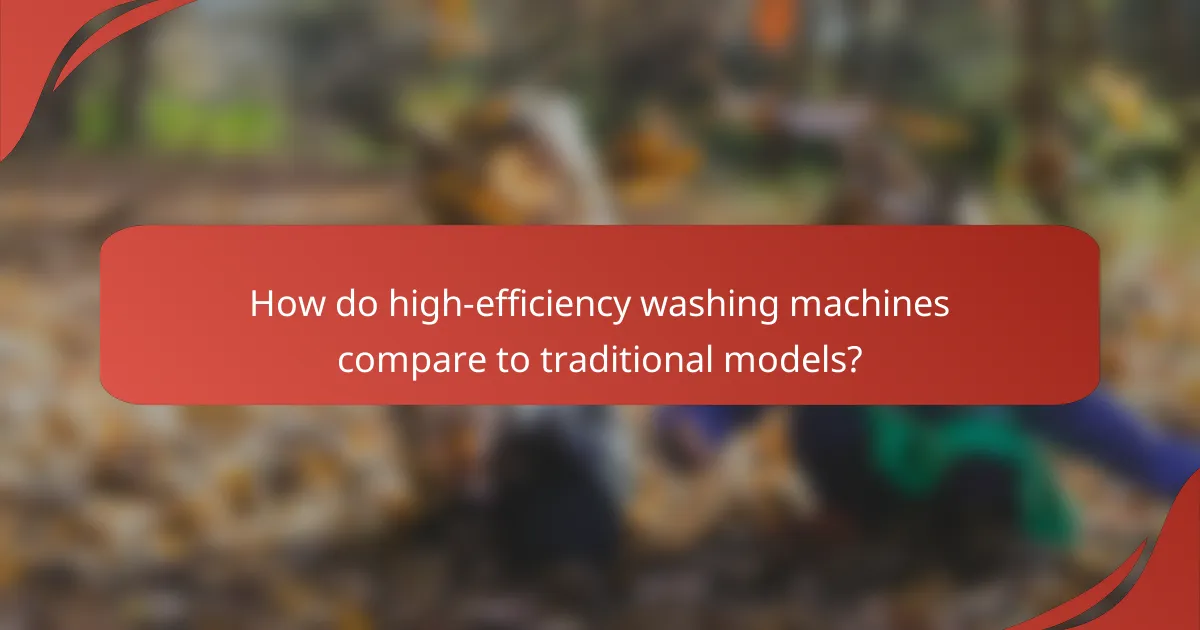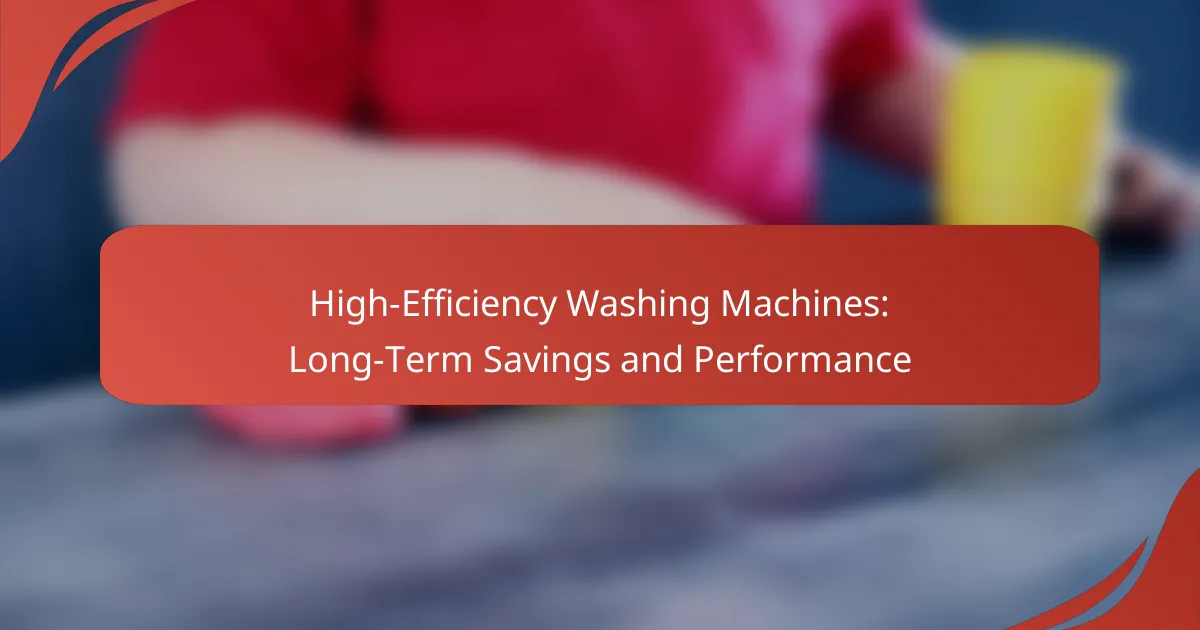High-efficiency washing machines are an excellent investment for those looking to save on water and energy costs while enjoying superior cleaning performance. By utilizing advanced technology, these machines not only reduce utility bills but also tend to require fewer repairs, ensuring long-term savings and durability. When choosing a model, it’s essential to consider features like load capacity and energy ratings to maximize both efficiency and user satisfaction.

What are the benefits of high-efficiency washing machines?
High-efficiency washing machines offer significant advantages, primarily in water and energy savings, improved cleaning performance, and reduced costs over time. These machines are designed to use less water and energy while delivering superior cleaning results, making them a smart choice for environmentally conscious consumers and budget-savvy households.
Lower water usage
High-efficiency washing machines typically use 30-50% less water than traditional models. This reduction not only conserves a vital resource but also lowers water bills, especially in areas with higher water costs. For example, a standard washing machine may use around 40 gallons per load, while a high-efficiency model may use only 15-25 gallons.
Additionally, many high-efficiency machines come with sensors that adjust water levels based on the load size, ensuring that you are not wasting water on smaller loads. This feature further enhances water conservation efforts.
Energy savings
These washing machines are designed to consume less electricity, often leading to energy savings of 20-50% compared to conventional models. This efficiency is achieved through advanced technology, such as faster spin cycles that extract more water from clothes, reducing drying time.
In practical terms, using a high-efficiency washing machine can lower your monthly electricity bill, especially if you do multiple loads each week. Over time, these savings can add up significantly, making the initial investment worthwhile.
Improved cleaning performance
High-efficiency washing machines often feature advanced cleaning technologies that enhance stain removal and overall wash quality. They use a combination of high-speed agitation and specialized wash cycles to tackle tough stains effectively.
Moreover, the use of less water does not compromise cleaning power; instead, it allows for better distribution of detergent and improved soil suspension, resulting in cleaner clothes after each wash.
Longer lifespan
High-efficiency washing machines are generally built with more durable components, which can lead to a longer lifespan compared to traditional models. Many manufacturers offer warranties of up to 10 years, reflecting their confidence in the machine’s longevity.
Regular maintenance, such as cleaning the lint filter and checking hoses, can further extend the life of these machines, ensuring you get the most out of your investment.
Reduced detergent costs
High-efficiency washing machines require less detergent per load, often using only one-third of the amount needed for standard machines. This reduction in detergent usage not only saves money but also minimizes the environmental impact of detergent production and disposal.
Many high-efficiency models are designed to work best with HE (high-efficiency) detergents, which are formulated to produce fewer suds and work effectively in lower water levels. This means you can achieve clean clothes without overspending on laundry supplies.

How do high-efficiency washing machines save money?
High-efficiency washing machines save money primarily through reduced water and energy consumption, leading to lower utility bills over time. Additionally, their advanced technology often results in fewer repairs and longer-lasting performance, further enhancing savings.
Lower utility bills
High-efficiency washing machines use significantly less water and energy compared to traditional models. On average, they can save households around 20-30% on water usage and 10-50% on energy costs, depending on local utility rates and usage patterns.
For example, if your monthly water bill is around $30, switching to a high-efficiency model could reduce that by $6 to $9. Similarly, energy savings can translate into noticeable reductions in your electricity bill, especially during peak usage times.
Less frequent repairs
These machines are designed with advanced technology that minimizes wear and tear, leading to fewer breakdowns. Many high-efficiency models come with warranties that cover repairs for several years, which can save you money on maintenance costs.
In contrast, traditional washing machines may require repairs more often, especially as they age. Investing in a high-efficiency model can mean fewer service calls and less hassle over time.
Long-term durability
High-efficiency washing machines are built with durable components that contribute to their longevity. While the initial investment may be higher, the lifespan of these machines often exceeds that of standard models, making them a cost-effective choice in the long run.
Many high-efficiency models can last over a decade with proper care, while traditional machines may need replacement after 7-10 years. This durability not only saves money on replacements but also reduces waste, making it a more environmentally friendly option.

What features should you consider when choosing a high-efficiency washing machine?
When selecting a high-efficiency washing machine, consider features such as load capacity, spin speed, energy ratings, and smart technology integration. These factors significantly impact performance, water and energy savings, and overall user experience.
Load capacity
Load capacity refers to the amount of laundry a washing machine can handle in a single cycle, typically measured in kilograms or pounds. Most high-efficiency models range from 5 to 10 kg, allowing for larger loads that can save time and water. Choose a capacity that fits your household’s laundry needs to maximize efficiency.
A larger capacity machine can reduce the number of cycles needed, which is beneficial for families or those with frequent laundry demands. However, if you have limited space or do smaller loads, a compact model may be more suitable.
Spin speed
Spin speed, measured in revolutions per minute (RPM), affects how much water is extracted from clothes during the spin cycle. Higher spin speeds, typically between 1200 and 1600 RPM, lead to drier clothes and shorter drying times, which can save energy and reduce wear on fabrics.
While a higher spin speed is advantageous, it may also increase noise levels and vibration. Consider the balance between efficiency and comfort, especially if your laundry area is near living spaces.
Energy ratings
Energy ratings indicate a washing machine’s efficiency in consuming electricity and water. Look for models with ENERGY STAR certification, which signifies compliance with strict energy efficiency guidelines. High-efficiency machines can reduce energy consumption by 20-50% compared to standard models.
In many regions, energy-efficient appliances may qualify for rebates or tax incentives, further enhancing long-term savings. Always check local regulations and available programs to maximize your investment.
Smart technology integration
Smart technology integration allows washing machines to connect to your home network, enabling features like remote control, cycle monitoring, and maintenance alerts. Models with Wi-Fi connectivity can be controlled via smartphone apps, providing convenience and flexibility.
While smart features can enhance user experience, they may also increase the initial cost of the machine. Evaluate whether the added convenience aligns with your lifestyle and if the potential savings in water and energy justify the investment.

What are the top high-efficiency washing machine brands?
The leading high-efficiency washing machine brands include LG, Samsung, Whirlpool, and Bosch. These manufacturers are recognized for their innovative technology, energy efficiency, and reliable performance, making them popular choices for consumers looking to save on utility bills while maintaining effective cleaning capabilities.
LG
LG is known for its advanced technology and user-friendly features in high-efficiency washing machines. Their models often include smart technology that allows for remote control and monitoring via smartphone apps, enhancing convenience.
Many LG machines also feature TurboWash technology, which can significantly reduce wash times while maintaining cleaning performance. Additionally, their energy-efficient models are designed to use less water and electricity, contributing to long-term savings.
Samsung
Samsung offers a range of high-efficiency washing machines that emphasize innovation and design. Their EcoBubble technology creates bubbles that penetrate fabrics quickly, allowing for effective cleaning at lower temperatures, which can save on energy costs.
Samsung machines often come equipped with features like AddWash, enabling users to add forgotten items mid-cycle. This flexibility, combined with their energy-saving capabilities, makes Samsung a strong contender in the high-efficiency market.
Whirlpool
Whirlpool is a trusted name in home appliances, providing high-efficiency washing machines that focus on reliability and performance. Their models typically include features such as Load & Go dispensers, which automatically release detergent based on load size, minimizing waste.
Whirlpool machines are designed to be user-friendly, with intuitive controls and customizable settings. Their commitment to energy efficiency helps consumers save money on utility bills while ensuring effective laundry results.
Bosch
Bosch is renowned for its compact and efficient high-efficiency washing machines, particularly popular in European markets. Their models are designed to fit smaller spaces without compromising on performance or capacity.
Many Bosch machines feature advanced sensors that adjust water usage and cycle times based on load size, enhancing efficiency. Their quiet operation and energy-saving designs make them an excellent choice for eco-conscious consumers looking for reliable washing solutions.

How do high-efficiency washing machines compare to traditional models?
High-efficiency washing machines use less water and energy compared to traditional models, resulting in lower utility bills over time. They typically have larger capacities and advanced features that enhance cleaning performance while being gentler on fabrics.
Water usage comparison
High-efficiency washing machines generally use about 30-50% less water than traditional models. While a standard washer may consume around 40-45 gallons per load, high-efficiency machines often require only 15-30 gallons.
This significant reduction in water usage not only lowers your water bill but also contributes to environmental conservation. Many regions have water usage regulations, making high-efficiency models a smart choice for compliance and sustainability.
When selecting a washing machine, consider the water factor rating, which indicates how much water is used per cycle. Aim for models with a lower water factor to maximize savings and efficiency.
